Picture this: You’re at your favorite Dallas restaurant, hesitating to order that perfectly grilled steak because you’re worried about your missing teeth. You find yourself covering your mouth when you laugh, avoiding photos, and missing out on the confidence that comes with a complete, beautiful smile. If this sounds familiar, you’re not alone—and more importantly, there’s a solution that can transform your life: the dental implant bridge.
A dental implant bridge isn’t just about replacing missing teeth; it’s about reclaiming your confidence, restoring your ability to eat the foods you love, and getting back to living life without limitations. Unlike traditional bridges that rely on adjacent teeth for support, dental implant bridges offer a permanent, stable solution that looks, feels, and functions just like your natural teeth.
Key Takeaways
- Dental implant bridges replace multiple missing teeth using strategically placed implants as anchors, offering superior stability compared to traditional bridges
- Long-term value makes implant bridges cost-effective despite higher upfront costs, with proper care lasting 15-25 years or more
- Bone preservation is a crucial benefit, as implants stimulate jawbone growth and prevent the facial collapse associated with tooth loss
- Treatment timeline typically spans 3-6 months, allowing for proper healing and integration before final restoration placement
- Success rates exceed 95% when performed by experienced professionals with proper patient selection and aftercare
What Is a Dental Implant Bridge?
A dental implant bridge is a revolutionary tooth replacement solution that combines the stability of dental implants with the comprehensive coverage of a bridge. Instead of relying on neighboring teeth for support like traditional bridges, this innovative approach uses titanium implants surgically placed in your jawbone as anchors.
Think of it as building a bridge with the strongest possible foundation. The implants act as artificial tooth roots, providing unmatched stability and preserving your jawbone health. This means you can bite into an apple, enjoy a hearty laugh, and smile with complete confidence—something that’s often challenging with removable dentures or traditional bridges.
How Dental Implant Bridges Work
The magic happens through a process called osseointegration—don’t worry, it’s simpler than it sounds! Your jawbone naturally grows around and bonds with the titanium implants, creating a permanent foundation that’s actually stronger than natural tooth roots. Once this integration is complete, your custom bridge is attached, giving you a seamless row of beautiful, functional teeth.
Types of Dental Implant Bridges
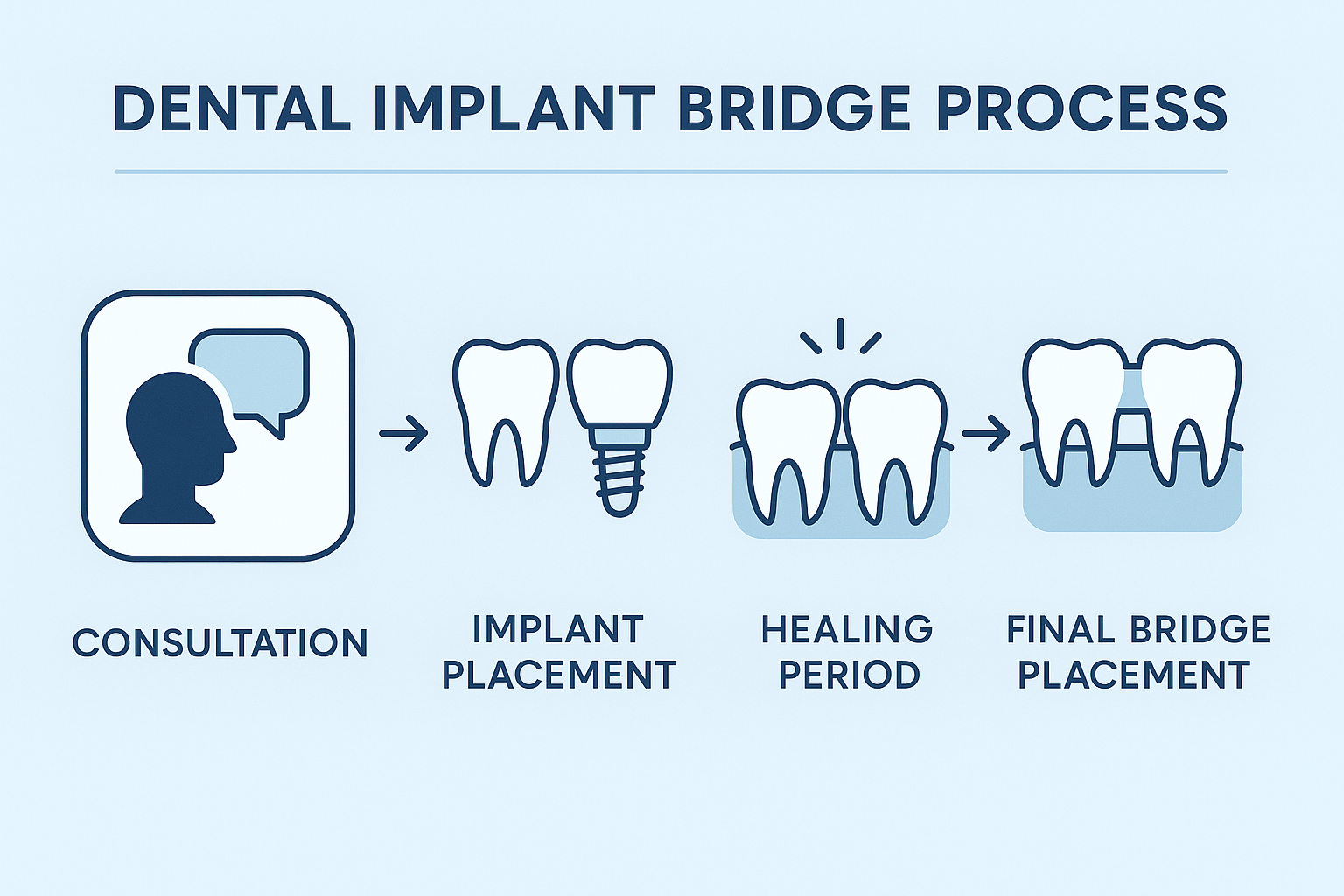
Understanding your options helps you make the best decision for your unique situation. Here are the main types of dental implant bridges available:
Traditional Implant-Supported Bridge
This approach places one implant for every missing tooth, offering maximum stability and individual tooth replacement. While more expensive, it provides the most natural feel and easiest maintenance.
Implant-Supported Bridge with Fewer Implants
A cost-effective solution where 2-4 strategically placed implants support a bridge replacing 3-6 teeth. This option balances affordability with excellent functionality.
All-on-4 or All-on-6 Bridges
Perfect for those missing most or all teeth in an arch, these full-mouth solutions use just 4-6 implants to support an entire set of teeth. It’s life-changing for patients with extensive tooth loss.
Hybrid Bridges
Combining implants with traditional bridge techniques, these solutions work well when you have some healthy teeth that can share the load with strategically placed implants.
Benefits of Choosing a Dental Implant Bridge
Restore Your Confidence 😊
There’s nothing quite like the feeling of smiling without hesitation. Dental implant bridges look so natural that even you might forget they’re not your original teeth. No more covering your mouth when you laugh or avoiding photos—your smile becomes your greatest asset again.
Eat What You Love
Remember the joy of biting into fresh corn on the cob or savoring a perfectly cooked steak? With dental implant bridges, those days return. The stable foundation means you can enjoy all your favorite foods without worry or discomfort.
Preserve Your Facial Structure
Missing teeth cause your jawbone to shrink over time, leading to a sunken, aged appearance. Dental implants actually stimulate bone growth, maintaining your youthful facial structure and preventing the “caved-in” look that often comes with tooth loss.
Long-Term Investment
While the initial cost might seem significant, dental implant bridges often prove more economical over time. With proper care, they can last 15-25 years or even a lifetime, unlike traditional bridges that typically need replacement every 10-15 years.
No Impact on Healthy Teeth
Traditional bridges require grinding down healthy adjacent teeth. Dental implant bridges stand independently, preserving your natural teeth and maintaining your overall oral health.
The Dental Implant Bridge Process: Your Journey to a Better Smile
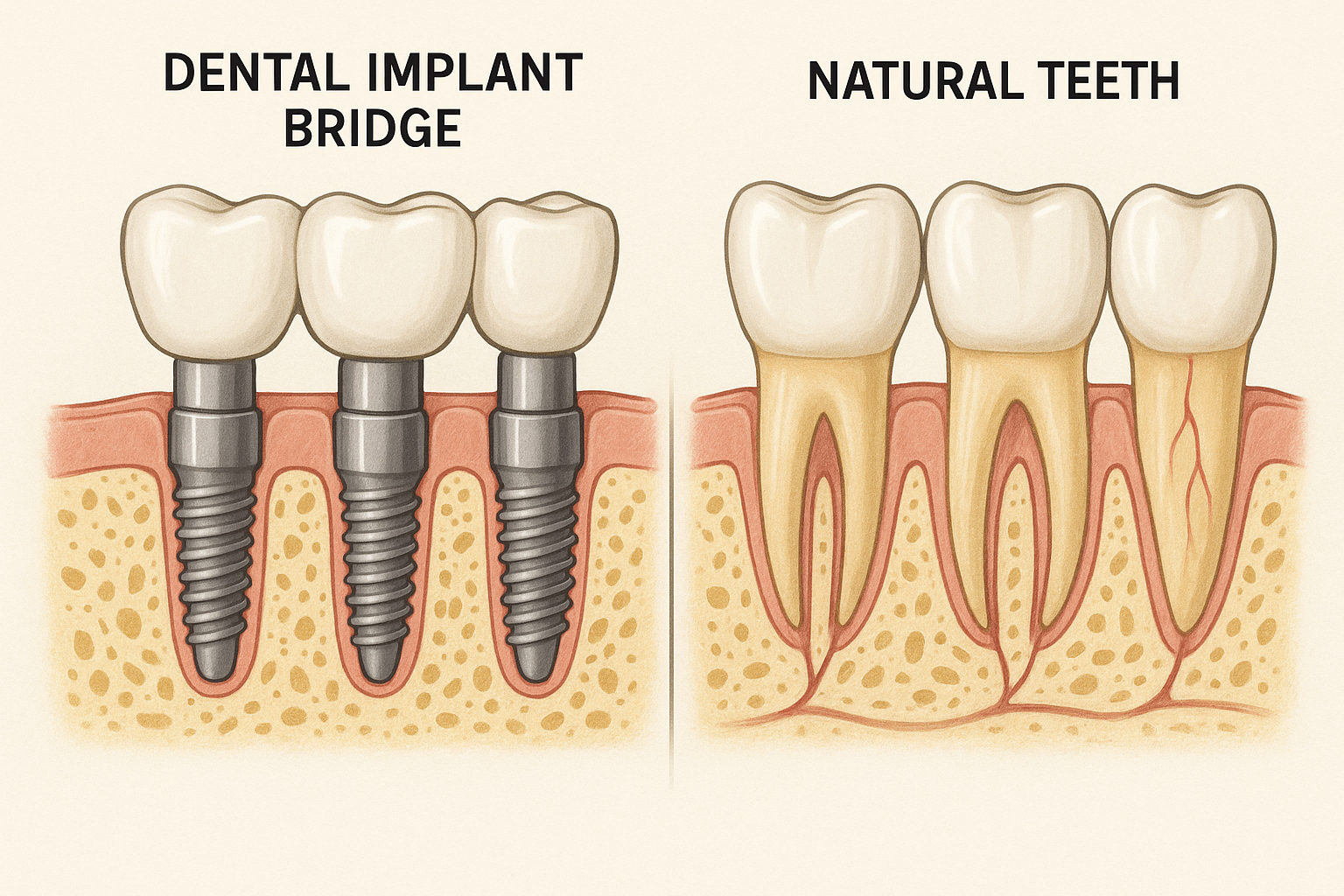
Understanding what to expect helps ease any anxiety about the process. Here’s your step-by-step journey:
Initial Consultation and Planning
Your journey begins with a comprehensive evaluation where we assess your oral health, discuss your goals, and create a personalized treatment plan. Advanced 3D imaging helps us plan the precise placement of your implants for optimal results.
Implant Placement Surgery
Using local anesthesia and sedation options for your comfort, the titanium implants are carefully placed in your jawbone. Most patients are surprised by how comfortable the procedure is—many describe it as easier than having a tooth extracted.
Healing and Integration Period
Over the next 3-6 months, your implants integrate with your jawbone. During this time, you’ll wear a temporary bridge that allows you to eat and smile normally while your permanent solution develops its strong foundation.
Final Bridge Placement
Once integration is complete, your custom-crafted bridge is attached to the implants. This moment—seeing your complete, beautiful smile for the first time—is often emotional for patients who’ve lived with missing teeth.
Cost Considerations and Value
Let’s address the elephant in the room: cost. Yes, dental implant bridges require a significant investment, but understanding the value helps put the expense in perspective.
Typical cost ranges in Dallas:
- Single implant bridge (3-4 teeth): $6,000-$12,000
- Multiple tooth bridge: $15,000-$30,000
- Full arch restoration: $20,000-$40,000
Why the Investment Makes Sense
Consider this: a traditional bridge might cost $3,000-$5,000 initially but will likely need replacement 2-3 times over 25 years. Add the potential damage to supporting teeth, and the long-term costs often exceed those of dental implant bridges.
Many patients find that discount tooth implants and financing options make treatment more accessible than they initially thought. We work with you to find a solution that fits your budget and timeline.
Candidacy: Are You a Good Fit for Dental Implant Bridges?
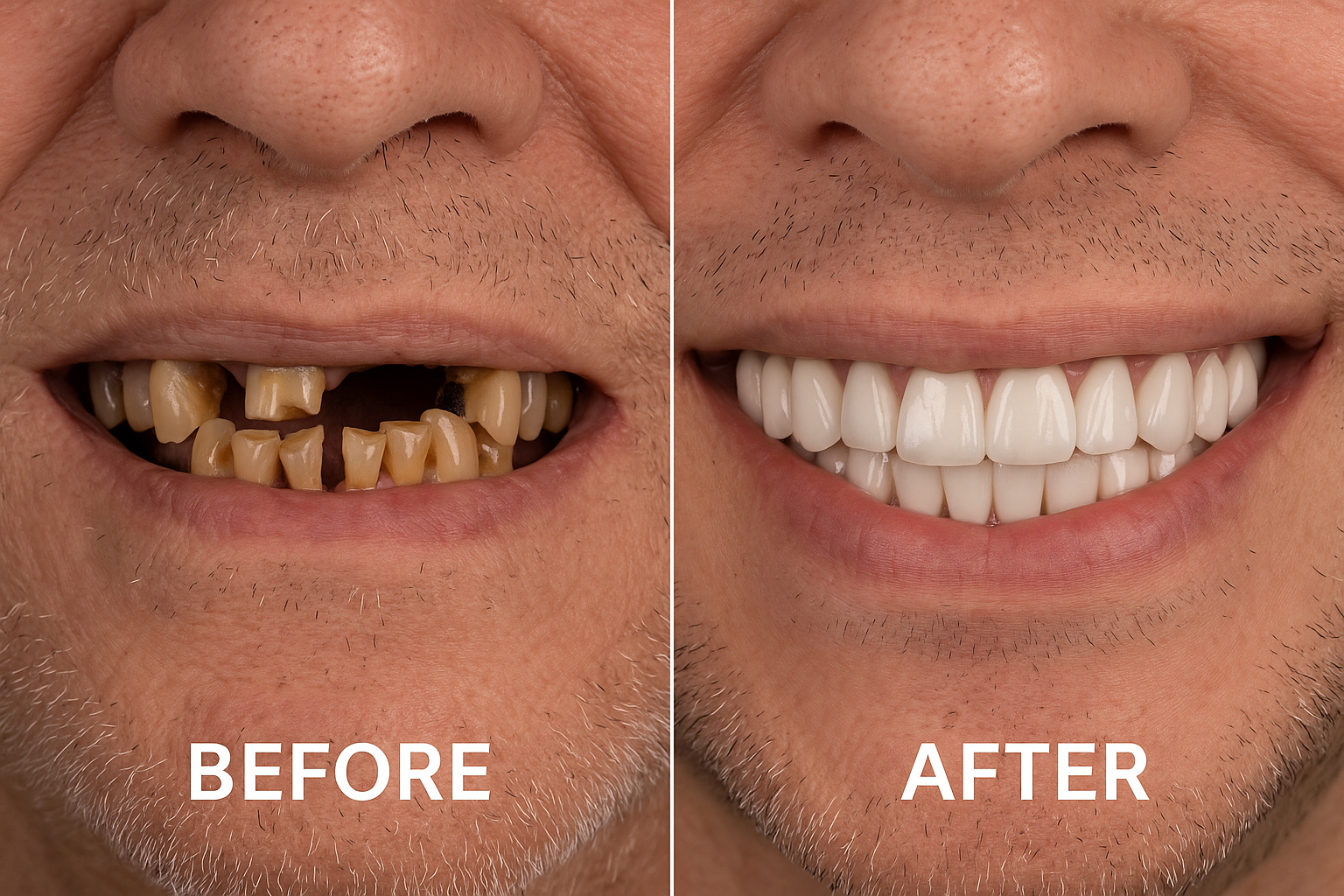
Most people with missing teeth are excellent candidates for dental implant bridges, but certain factors influence success:
Ideal Candidates:
- Good general and oral health
- Adequate jawbone density
- Non-smokers or willing to quit during treatment
- Committed to excellent oral hygiene
- Realistic expectations about the process
Factors That May Require Additional Treatment:
- Insufficient bone density (often addressed with bone grafting)
- Gum disease (treated before implant placement)
- Certain medical conditions (managed with your physician)
The good news? Even if you’re not an immediate candidate, there are often solutions to help you become one. Complete dental implants consultations help determine the best path forward for your unique situation.
Dental Bridge Options Comparison Tool
Compare different tooth replacement options to find what’s best for you
| Treatment Option | Durability | Initial Cost | Comfort | Bone Preservation | Maintenance |
|---|---|---|---|---|---|
| Dental Implant Bridge | Excellent 15-25+ years |
High $6,000-$30,000 |
Excellent Feels natural |
Excellent Stimulates growth |
Low Regular brushing |
| Traditional Bridge | Good 10-15 years |
Moderate $3,000-$5,000 |
Good Some adjustment |
Poor Continued loss |
Moderate Special flossing |
| Partial Dentures | Fair 5-8 years |
Low $1,000-$3,000 |
Fair May slip/click |
Poor Accelerated loss |
High Daily removal/cleaning |
| No Treatment | Poor Permanent gaps |
None $0 initially |
Poor Limited function |
Poor Severe bone loss |
None No special care |
Comparing Your Options: Implant Bridge vs. Alternatives
Potential Risks and Considerations
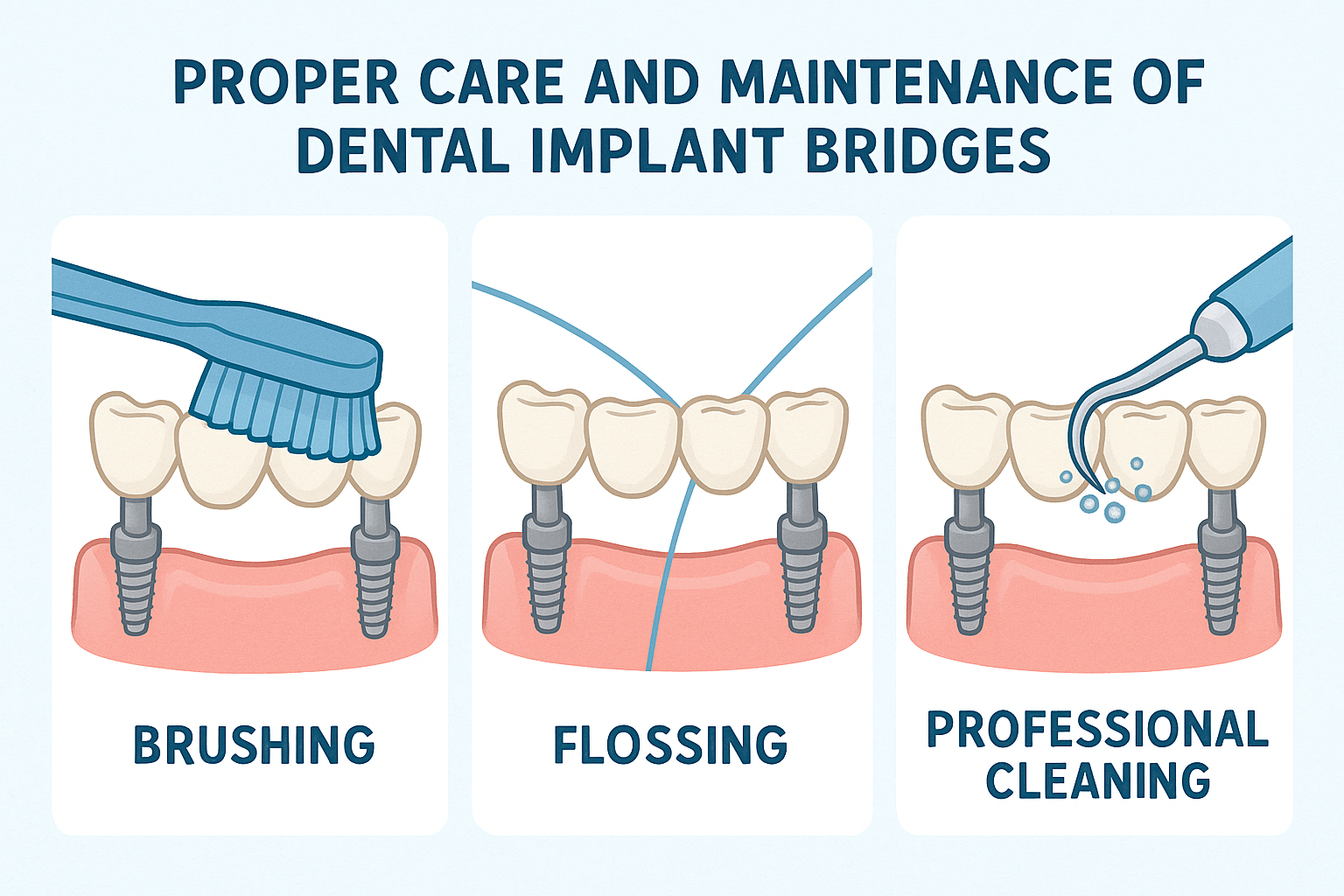
Like any medical procedure, dental implant bridges come with some considerations. However, the risks are minimal when you choose an experienced provider:
Rare Complications:
- Infection at the implant site (less than 2% of cases)
- Implant failure (occurs in less than 5% of cases)
- Temporary swelling or discomfort
How We Minimize Risks:
- Comprehensive pre-treatment planning
- Sterile surgical techniques
- Detailed post-operative care instructions
- Regular follow-up appointments
Most patients find that any temporary discomfort is far outweighed by the life-changing benefits. Many describe the process as much easier than they anticipated, especially when they consider how long dental implants last and the freedom they provide.
Caring for Your Dental Implant Bridge
One of the best aspects of dental implant bridges is how simple they are to maintain. Here’s how to keep your investment looking and functioning beautifully:
Daily Care Routine:
- Brush twice daily with a soft-bristled toothbrush
- Floss daily using regular floss or water flossers
- Use an antimicrobial mouthwash
- Avoid hard foods that could damage the bridge
Professional Maintenance:
- Regular dental cleanings every 6 months
- Annual X-rays to monitor implant health
- Professional assessments of bridge fit and function
With proper care, your dental implant bridge can last decades. Many patients find that maintaining their implant bridge is actually easier than caring for natural teeth, especially when compared to the complex cleaning routines required for traditional bridges.
Finding the Right Provider in Dallas
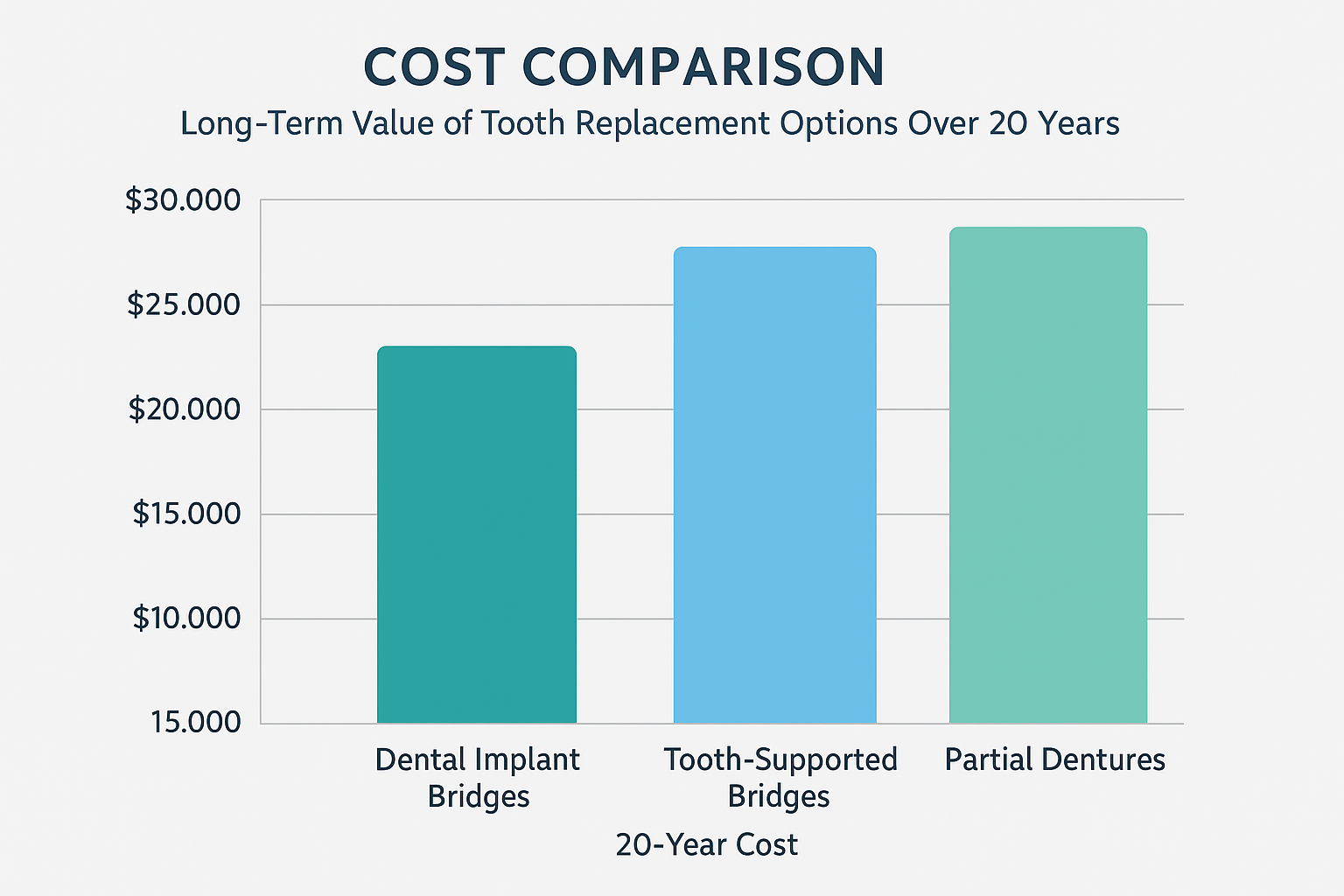
Choosing the right dental professional for your implant bridge is crucial for success. Here’s what to look for:
Key Qualifications:
- Board certification in oral surgery or periodontics
- Extensive experience with implant procedures
- Modern technology and techniques
- Comprehensive treatment planning capabilities
Questions to Ask:
- How many implant bridges have you placed?
- What is your success rate?
- Can you show me before/after photos?
- What warranty or guarantee do you provide?
When searching for the best dental implant centers, don’t just focus on price. The expertise, technology, and long-term support you receive are far more important than saving a few dollars upfront.
Timeline and Recovery Expectations
Understanding the timeline helps you plan for your treatment and set realistic expectations:
Phase 1: Initial Consultation (1-2 weeks)
- Comprehensive examination
- 3D imaging and treatment planning
- Discussion of options and costs
Phase 2: Implant Placement (1 day)
- Surgical placement of implants
- Temporary bridge placement if needed
- Initial healing period begins
Phase 3: Integration Period (3-6 months)
- Implants integrate with jawbone
- Regular check-ups to monitor healing
- Temporary bridge adjustments as needed
Phase 4: Final Restoration (2-3 weeks)
- Final impressions and bridge fabrication
- Bridge placement and adjustments
- Final instructions and care guidelines
Most patients return to normal activities within a few days of implant placement. The integration period requires patience, but it’s during this time that your implants develop the strength that will support you for decades to come.
Insurance and Financing Options
While dental insurance coverage for implant bridges varies, many patients are surprised to learn about available options:
Insurance Considerations:
- Some plans cover a portion of the bridge restoration
- Medical insurance may cover implants in certain circumstances
- FSA and HSA accounts can often be used for treatment
Financing Solutions:
- In-house payment plans
- Third-party financing with low or no interest
- Treatment phasing to spread costs over time
Don’t let cost concerns prevent you from exploring your options. Many dental implant centers offer flexible financing that makes treatment more accessible than you might expect.
The Life-Changing Impact: Real Patient Experiences
The true measure of dental implant bridge success isn’t found in statistics—it’s in the transformed lives of patients who’ve regained their confidence and quality of life.
Sarah, 45, Dallas: “I avoided smiling for years after losing my front teeth in an accident. Getting my implant bridge was the best decision I ever made. I actually forget they’re not my natural teeth!”
Mike, 58, Plano: “I was tired of my partial denture slipping when I talked. My implant bridge gave me back my confidence at work and socially. I can eat anything I want now!”
Maria, 62, Richardson: “The investment seemed big at first, but after three years, I realize it was worth every penny. My face looks younger, and I feel like myself again.”
These stories reflect what we see every day: dental implant bridges don’t just replace teeth—they restore lives.
Making Your Decision: Next Steps
If you’re considering a dental implant bridge, you’re already on the path to transforming your smile and your life. Here’s how to move forward:
Schedule a Consultation
The first step is always a comprehensive evaluation. During this visit, you’ll learn about your specific options, timeline, and investment required. There’s no obligation, and the information you gain will help you make an informed decision about your oral health future.
Ask Questions
Come prepared with questions about the process, recovery, and long-term expectations. A reputable provider will take time to address all your concerns and ensure you feel confident about moving forward.
Consider Your Timeline
While dental implant bridges require some time for completion, the sooner you begin, the sooner you’ll be enjoying your new smile. Delaying treatment often means continued bone loss and potentially more complex procedures later.
Conclusion
A dental implant bridge represents more than just a tooth replacement solution—it’s an investment in your confidence, health, and quality of life. While the decision requires careful consideration of cost, timeline, and commitment to care, the benefits extend far beyond what any traditional bridge or denture can offer.
Your journey to a better smile starts with a single step. Whether you’re missing a few teeth or need comprehensive restoration, dental implant bridges offer a permanent solution that can truly change your life. The technology, techniques, and materials available in 2025 make this the best time in history to restore your smile with confidence.
Ready to explore how a dental implant bridge can transform your life? Contact our Dallas dental implant specialists today to schedule your consultation. Your future smile is waiting, and we’re here to make the journey as comfortable and successful as possible.
Remember, every day you wait is another day you’re not living with the confidence and freedom that comes with a complete, beautiful smile. You deserve to eat what you love, laugh without hesitation, and smile with pride. A dental implant bridge can make that reality yours.

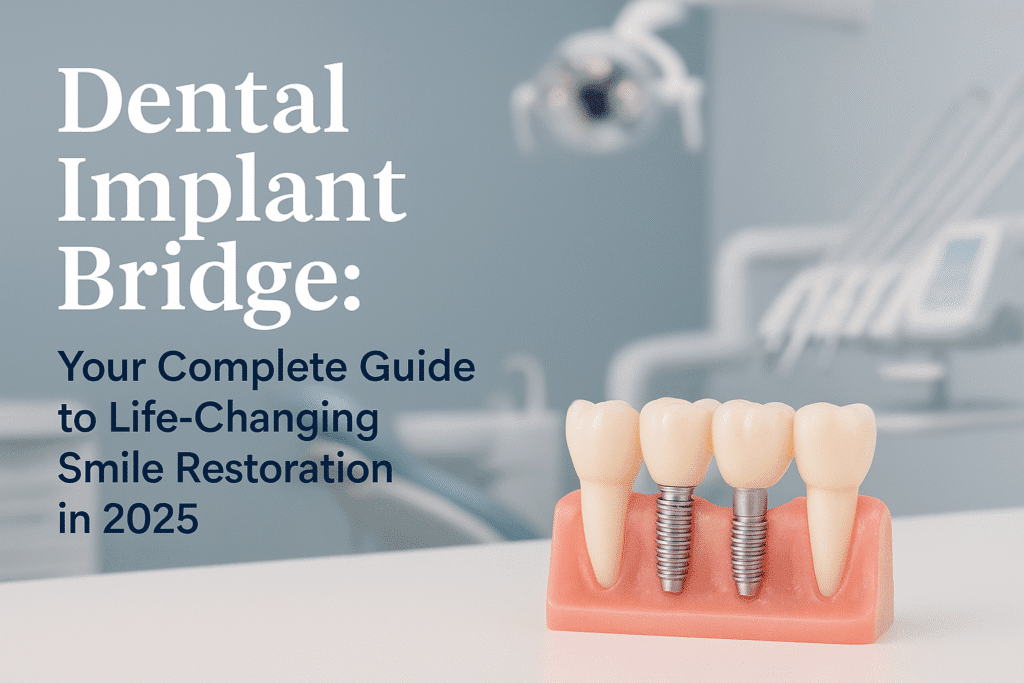
Leave a Reply
Share your thoughts or ask a question about dental implants. Your email address will not be published.